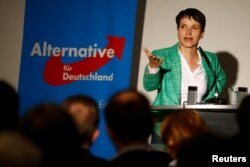German Chancellor Angela Merkel's conservatives look set to suffer losses Sunday in a Berlin city vote — the second electoral blow within two weeks — as a growing number of voters are expected to express their unease with her refugee-friendly policy.
The anti-immigrant Alternative for Germany (AfD) is expected to profit from a popular backlash over Merkel's decision a year ago to keep German borders open for refugees, and the party could enter its 10th regional assembly out of Germany's 16 states.
Polls point to heavy losses for Merkel's Christian Democrats (CDU) in the vote for the Berlin city assembly, which means the center-left Social Democrats (SPD) may be able to ditch them from their current coalition.
That would most likely raise the pressure further on Merkel one year before a federal election and could deepen divisions within her conservative camp.
A drubbing in the eastern state of Mecklenburg-Vorpommern two weeks ago triggered calls from Merkel's conservative allies in Bavaria to toughen up her migrant policy, with measures such as introducing a cap of 200,000 refugees per year.
Merkel rejects such a limit and defends her approach to finding a European solution to the migration issue by securing the continent's external borders, agreeing on migration deals with countries like Turkey and distributing refugees across Europe.
Another run by Merkel?
The recent election losses have even raised questions about whether Merkel, Europe's most powerful leader, will stand for a fourth term next year, but her party has few good alternatives so she still looks like the most likely candidate.
The latest Berlin poll by Forschungsgruppe Wahlen for the ZDF public broadcaster put the CDU at 18 percent, down 5 percentage points from the last election in 2011 and far behind the SPD's projected 23 percent. It put the AfD at 14 percent, the environmentalist Greens at 15 percent and the leftist Die Linke at 14.5 percent.
The AfD has campaigned heavily on the migrant issue, playing to voters' fears about the cost of the roughly 1 million migrants who entered Germany last year and about their integration.
Security, especially after two attacks claimed by Islamic State in Bavaria in July that injured 20 people and deadly Islamist militant attacks in neighboring France and Belgium earlier in the year, are also a concern to voters.
The SPD, Merkel's junior coalition partner at the federal level, wants to form a coalition with the Greens and, if needed, the leftist Die Linke.
Berlin's SPD Mayor Michael Mueller has sharply criticized the AfD's migration policy during the campaign, saying a double-digit score for the right-wing party would be seen around the world as the rebirth of the Nazis.






